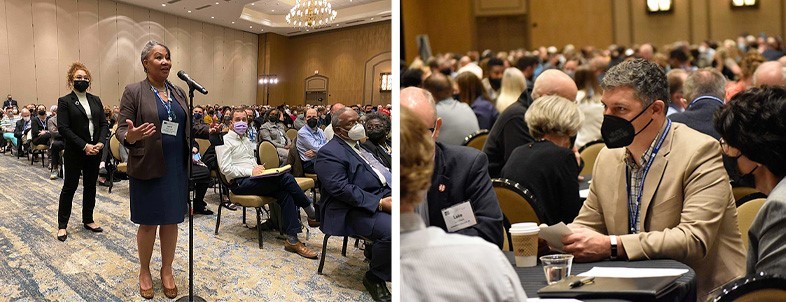
Under the theme “Called into Community: Vocation, Engagement, and Difference,” CIC’s 2022 Network for Vocation in Undergraduate Education (NetVUE) Conference explored issues of justice, inclusion, and the common good. Noted public intellectual Eddie S. Glaude, Jr. delivered a powerful keynote address about the paradox of liberal education—its capacity to produce critical thinkers, but also to form them to align with current cultural norms. He emphasized the need for educators to cut through this paradox if they hope to educate students to become agents of change. Invoking James Baldwin and Edward Said, Glaude called upon those assembled to “produce graduates who question and unsettle.” He argued that “it is incumbent upon us to imagine new possibilities,” with the reminder that “participatory democracies are always fragile.” Many of the nearly 800 participants at the conference found Glaude’s prophetic words inspiring. Glaude is the James S. McDonnell Distinguished University Professor and chair of the Department of African American Studies at Princeton University. The conference took place in Dallas, Texas, March 24–26.
This year’s conference intentionally foregrounded issues of social justice. Diversity, equity, and inclusion have long been salient issues on NetVUE member campuses, but they have grown particularly prominent since the previous NetVUE Conference, held in 2019. According to NetVUE Director David Cunningham, these issues are now integral to the conversation about vocation. He observed that “NetVUE member institutions regularly report that students of color engage in vocational exploration programs at a much lower rate than do students in general. Perhaps some of the ways that we use the language of vocation may unintentionally set up obstacles for minoritized students.”
Cunningham’s concern is echoed in the book that NetVUE is using for its 2022 “Big Read” project, Patrick Reyes’s The Purpose Gap: Empowering Communities of Color to Find Meaning and Thrive. Reyes observes that much of the literature on leadership and vocation tells a series of stories about “heroes’ journeys,” in which solitary individuals overcome obstacles and succeed through their own extraordinary efforts. Such stories, he writes, fail to recognize the many roadblocks that are encountered by those living in marginalized communities. If NetVUE institutions are to provide all students with genuine opportunities for vocational reflection and discernment, they will need to ensure that their programming resonates across a range of differences in demography and worldview.

To that end, the NetVUE Conference also featured 25 campus presentations, many explicitly engaging the relationships among vocation, inclusion, and social justice. In one of the most heavily attended sessions, Butler University (IN) participants Daniel Meyers (director of the Center for Faith and Vocation) and Courtney Mohler (associate professor of theatre and assistant dean for Jordan College of the Arts) showed how a NetVUE grant enabled their campus to support instructors across the university to re-envision curricula and help students explore the intersections among vocational reflection, social justice, and diversity. Over 90 percent of the student survey respondents indicated that, as a result of the course, they are more likely to consider social justice and diversity issues when reflecting on their sense of purpose and planning for their future. The presenters offered strategies for how faculty and staff members at other institutions might revise courses along similar lines, using two questions as entry points: “What are the large problems your field of study is dedicated to solving?” and “What are the questions that animate your work?”
Lisa Stoneman, associate professor of education and department chair at Roanoke College (VA), discussed the college’s new BRIDGES program, which focuses on the recruitment, retention, and mentorship of students of color and the integration of programming related to race and racism across the curriculum for teacher education. A team from St. Norbert College (WI)—including Deirdre Egan-Ryan (director of Academic Service Learning), Derek Elkins, and Rebecca Lahti (co-directors of the Emmaus Center for Spiritual Life & Vocation)—shared how a NetVUE grant helped them bridge co-curricular student development and faculty development through a focus on community-engaged vocation. When the project leaders surveyed faculty members about their experiences, nearly 70 percent reported that the community-engaged work had “served as an expression of their values and convictions.” One faculty member wrote that this work “has fueled my teaching soul. It has helped me to see more clearly the impact that teaching and service, when intertwined and deliberately connected, have on my students. It has given me a stronger sense of conviction that what I am doing is good, right, and meaningful.”
Bay Path University’s (MA) Maura Devlin (dean of institutional effectiveness and accreditation) and Dinah Moore (executive director of the WELL Program) described their institution’s Guided Pathways program. This project addresses student success, vocation, and social justice—including outreach to new students before they arrive on campus. The initiative involves conducting early career assessments so students enter with a clear understanding of career options and how their education at Bay Path can help them achieve their goals. The subtitle of their presentation (“Toward a More Socially Just Model of Purpose”) captured the essence of many of the campus presentations this year.
Cunningham noted that, in the call for proposals for campus-led sessions, presenters were asked to describe how their sessions would contribute to the diversity of issues, participants, and perspectives at the conference. He was grateful for the positive response to this appeal, observing that “it would be a shame, I think, if our focus on vocation and calling ended up missing a whole cadre of students, only because we did not take the opportunity to find language, structures, and programs that pay attention to the diverse nature of the undergraduate audience.”
In addition to the sessions presented by campus teams, NetVUE offered a variety of concurrent workshops during the conference. These explored themes ranging from recent scholarship on vocation and books for the undergraduate setting, to self-assessment instruments and addressing religious differences among students. One workshop focused on the Crafting Democratic Futures project, in which CIC participates as a subgrantee with the University of Michigan, with support from the Mellon Foundation’s Just Futures initiative. Facilitators discussed snapshots of projects at five NetVUE campuses—Concordia College (MN), Connecticut College, Spelman College (GA), Wesleyan College (GA), and Wofford College (SC)—that are researching racial injustices in partnership with community organizations and proposing reparative solutions to local governments. The workshop helped participants consider how to engage students in similar work, as well as how to address the inevitable pushback that is generated by projects that focus on racial justice. Presenters emphasized ways in which student involvement with community partners can foster deep learning and vocational insight.

Similar issues were raised during the post-conference workshop “Promoting Vocational Exploration among Minoritized Students,” facilitated by Chris Arguedas, director of the Intercultural Community Center and special assistant to the president for equity and justice at Occidental College (CA); Kiki Kosnick, assistant professor of world languages, literatures, and cultures at Augustana College (IL); and Richard Sévère, associate professor and chair, Department of English, at Valparaiso University (IN). This workshop examined how vocation-related conversations draw on diverse narratives and deepen inclusive relationships. One participant, Caryn Riswold, McCoy Family Chair in Lutheran Heritage and Mission at Wartburg College (IA), observed that “the co-leaders made space for considering and critiquing language about ‘margins’ and ‘minorities,’ reflecting on our individual and institutional work, and encouraging our collective commitments toward equity and inclusion. It gathered threads and themes from the entire NetVUE Conference.”
As conference participants wrap up this academic year on their home campuses, CIC expects that conversations begun at NetVUE 2022 will continue and expand. (Materials from the conference sessions are available to those at NetVUE member institutions through the NetVUE Online Community Network.) These issues are also explored on the NetVUE blog, as well as on many episodes of the NetVUE podcast, Callings, which can be streamed or downloaded at netvue.buzzsprout.com or on most podcast sites. These and other NetVUE projects are administered by CIC with support from NetVUE member dues and generous funding from Lilly Endowment Inc.


